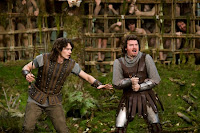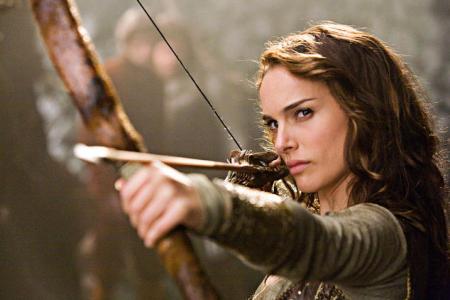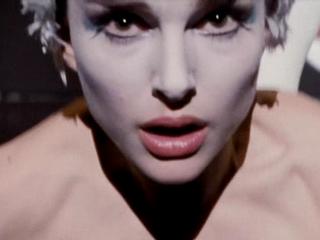 Wait just a minute. Am I watching the latest comedy by David Gordon Green, or a new installment of “Lord of the Rings”? No, this is just “Your Highness,” the latest film from the budding comedic mind of David Gordon Green and his usual comedic team. Seeing as this is his latest stoner comedy, and he is also the director of “Pineapple Express,” I have just one question: where is the weed? More on that in a bit.
Wait just a minute. Am I watching the latest comedy by David Gordon Green, or a new installment of “Lord of the Rings”? No, this is just “Your Highness,” the latest film from the budding comedic mind of David Gordon Green and his usual comedic team. Seeing as this is his latest stoner comedy, and he is also the director of “Pineapple Express,” I have just one question: where is the weed? More on that in a bit.
I could explain the whole story of “Your Highness,” but you’ll enjoy it better if you just think about the concept, and not every little plot detail. “Your Highness” takes place in some medieval kingdom where everyone’s accents are a little bit British, and a little bit Elvish. The king has two sons: the strong, noble Fabious (James Franco), and the constantly lazy, always stoned Thadeous (Danny McBride), who has yet to enter into the real world. Then one day, Thadeous is called on a mission to save his brother’s bride (Zooey Deschanel), and on their mission, they also meet Natalie Portman.

Maybe this sounds weird for a film that has a joke about a minotaur erection, but “Your Highness” could have had Shakespearian potential to it. Now, I am not saying it could have been as intelligent or witty as anything Shakespeare ever wrote, but I just believe the people behind it could have made a satire that is a little more, well, sophisticated. Seriously, after a while, a certain amount of gay jokes can become tiresome.
By saying this, I hope I’m not just sounding like some humorless, stuck-up film critic because honestly, a lot of this movie is very funny. People often dismiss jokes concerning bodily functions as dumb humor. Yet, if you do something funny with a gross joke, rather than just let it sit there, it becomes legitimately funny.
However, the problem with “Your Highness” is that those are really the only jokes the movie has. I expected much more from the team that made the smartest stoner comedy I’ve ever seen: “Pineapple Express.” In “Pineapple Express,” humor was found in the action, characters, and the concept itself. This is such a funny and original concept and yet, not enough of the ridiculousness of it was put to good use. While McBride is an excellent comedic actor, he just might not be as strong of a writer as Seth Rogen and Evan Goldberg are.

All of the actors in the film do their best, yet none of them can really reach their full potentials because of the writing. James Franco plays the role pretty much exactly as you’d expect him to. While McBride does great work in supporting roles, he is becoming a much better comedic leading man. His role here is pretty similar to his role as Kenny Powers in “Eastbound and Down”: a cocky, spoiled burnout with a lot of bad habits. Meanwhile, Natalie Portman, while a great screen presence as always, could have had a bit more comedy in her role. They basically wrote her as the straight-faced woman warrior, when I wish her performance was a little more like this.
The main problem with “Your Highness” is that it’s too timid to create humor in the unexpected. A lot of it seems forced, and not enough of it seems loose and free flowing. Therefore, it doesn’t feel like a true stoner comedy. When you’re trying to mix humor with dragons and knights, you shouldn’t be afraid to embrace the weirdness of your subject. Just think about the ending of “Role Models,” or the entirety of “Paul.” “Your Highness” never finds that proper balance between paying tribute and making fun of the subject it satirizes.

Also, the idea of this being a stoner comedy is more of a marketing ploy than an actual truth. That illegal plant that makes you giggle a lot is barely a presence in the film.
Am I maybe not getting “Your Highness”? Could another viewing change my opinion of the film? It took a while for critics and the general public to fully understand “Pineapple Express.” However, when I watched “Pineapple Express” for the first time, I realized there was just too much hidden in it for it to be fully appreciated after just one viewing. Unfortunately, I don’t feel that same attachment with “Your Highness.”







